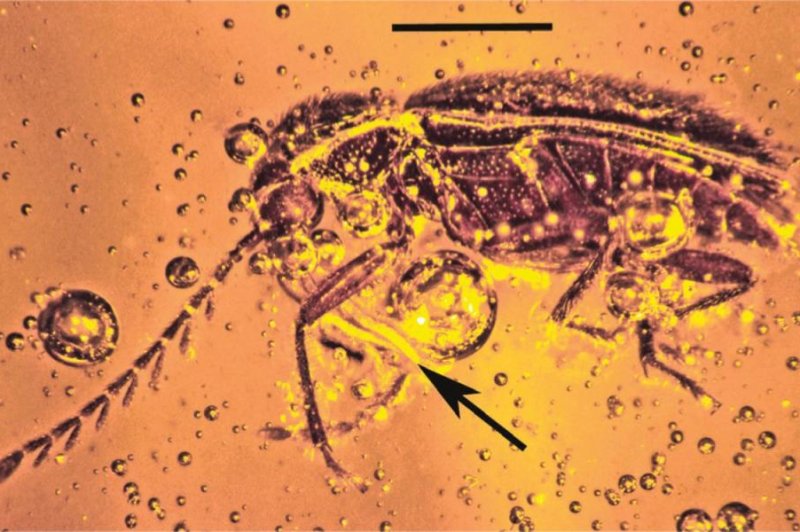A ptilodactyline beetle with pollen on its mouth pieces was found inside 20-million-year-old Mexican amber. Photo by Entomological Society of America
CORVALLIS, Ore., Aug. 22 (UPI) -- New research proves beetles have been pollinating flowers for at least 20 million years. Two pieces of fossilized amber have revealed ancient beetles with orchid pollen on their tentacle-like mouth pieces.
The amber and the beetles within are detailed in a new paper by Oregon State researcher George Poinar, Jr., published this week in the journal American Entomologist.
"My paper points out that beetles may play a more important role in pollinating orchids than originally thought, and that they have been doing so for some 20 million years," Poinar said in a news release.
Several modern beetle species have been documented drinking the nectar of flowers, including orchids, but this is the first fossil evidence of the phenomenon.
Poinar identified a hidden-snout beetle from the subfamily Cryptorhynchinae inside a Dominican amber fossil estimated to be 20 to 45 million years old. Pollen from the orchid species Cylindrocites browni was found on the beetle's thorax.
A toe-winged beetle from the family Ptilodactylidae was discovered inside fossilized amber from Mexico. It's believed to be between 22 and 26 million years old. The beetle's mouth pieces yielded pollen from the orchid species Annulites mexicana.
Though most people think of bees and butterflies when they think of pollinators, researchers say beetles are an underappreciated pollen-transporter. Their tremendous biodiversity is a boon to plants looking for specialized visitors.
There are more than 350,000 species of beetles currently described in the scientific literature, making them the most diverse order on Earth. In fact, beetles account for 40 percent of all insects.
Despite those large numbers, neither modern day hidden-snout beetles nor toe-winged beetles have been observed pollinating orchids. Poinar suggests the lack of evidence is likely a product of their secretive nature.
"While no present-day cryptorhynchid weevils or ptilodactyline beetles are known to carry pollinaria, past and future collections of these and other beetles should be examined to search for attached pollinaria," Poinar said. "Orchids may have evolved beneficial associations with a much wider range of beetles and other insects than we thought possible."















